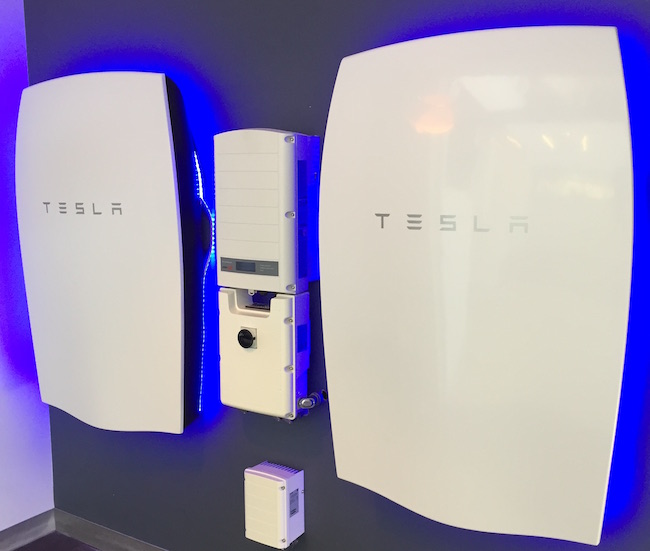
Ontario utility switches on microgrid project running on pair of Tesla Powerwalls
by Cleantech Canada Staff

Veridian Connections becomes first Canadian utility to install Tesla's energy storage unit, unveiling two Powerwalls at its Ajax, Ont. headquarters

The two Tesla 7kWh Powerwalls at Veridian’s headquarters in Ajax, Ont. The project is the first of its kind in Canada, and the first stage of the utility’s energy storage project. PHOTO: Veridian Connections
AJAX, Ont.—Tesla Motors Inc.’s Powerwall is finally making its way north.
As renewable enthusiasts, tech fanatics and energy-savvy homeowners eagerly await getting their hands on the company’s 7 kWh home battery system, Ontario utility Veridian Connections has installed a pair of new Powerwalls and established a microgrid at its corporate headquarters in Ajax, Ont.—just east of Toronto.
Veridian’s CEO, Michael Angemeer, said the company is “thrilled” to be the first Canadian utility to roll out the much-touted battery.
“Our goal is to demonstrate and evaluate the benefits of battery storage, renewable energy and electric vehicles for our residential customers, and make progress towards net-zero carbon emission homes and eventually virtual power plants—providing direct benefits and expanded services to our customers.” he said.
“It is important to test out flexible systems in the home or business and connections to our 24/7 system control centre from a technical and customer interface perspective to allow the optimal sharing of benefits between the customer and the utility,” Angemeer added.
Set in motion earlier this year, Veridian’s microgrid project will run on multiple sources of residential clean energy, allowing the company to test how to best-manage energy load to minimize costs.
The Powerwall installation is the first phase of a larger project that will create two microgrids at the company’s headquarters. Each small power grid will use a software platform created by Opus One Solutions to manage demand response and maximize efficiency. For the second stage of the project, Veridian is planning to install a solar carport and electric vehicle charging station. The utility is also looking to set up two additional residential microgrids in collaboration with a pair of homebuilders—something that could pave the way for a wider residential roll-out of the microgrid technology.
Meanwhile, individual Canadian consumers are expected to begin installing their own Tesla battery systems shortly. The automaker and energy company announced May 4 that it shipped 2,500 Powerwalls to customers worldwide in the first quarter of 2016.